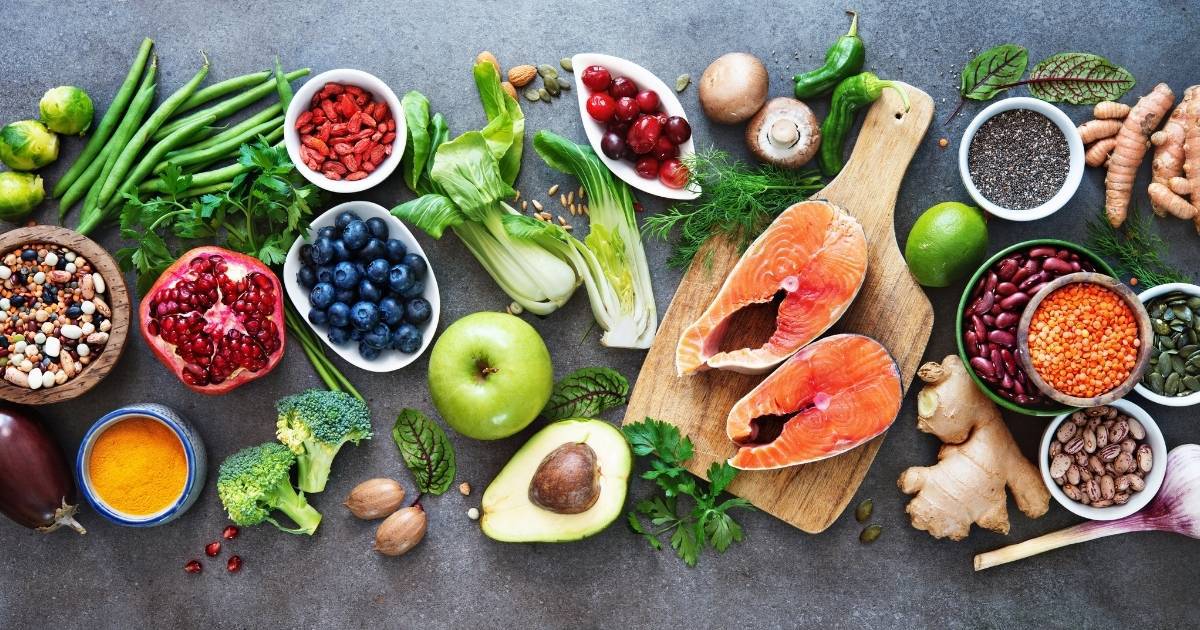Managing blood sugar levels with better food choices can sometimes seem more like an art than a science, and for good reason: everyone’s bodies are different, and we all react to food in different ways.
One thing is for certain, however: certain foods are inflammatory (like some processed foods and those with added sugars) and promote high blood sugars, while other foods are anti-inflammatory and help the body regulate blood sugar levels better (like fresh produce, and foods without any added sugar).
Eating anti-inflammatory foods that help regulate blood sugar levels is helpful for people who don’t have diabetes, too!
This article will examine the top 10 foods that help lower and regulate your blood sugar levels better.

Why focus on food?
Many people ask, “why focus on food, when you can just take extra medication like insulin or Metformin?”, and that’s a great question.
The aim of diabetes is not simply taking as much insulin as possible to fight high blood sugars, but to find a good balance of anti-inflammatory foods that you enjoy, incorporated into a healthy lifestyle with plenty of sleep, exercise, and stress management techniques, to create a sustainable way to manage your diabetes.
Focusing on foods that are anti-inflammatory and help regulate your blood sugar will not only improve your diabetes management, blood sugar levels, and HbA1c levels, but it will also make your weight management easier.
You’ll suffer fewer extreme high and low blood sugars, and managing your diabetes won’t be as joyless. It will be a big help. And with diabetes, we can use all the help we can get!
Below are the top 10 expert-recommended foods to help you regulate your blood sugar better:
Pumpkin and pumpkin seeds (pepitas)
Pumpkin seeds are like gold coins. These seeds are packed with protein, healthy fats, fiber, and antioxidants.
One cup of unshelled pumpkin seeds only has about 6 grams of net carbohydrates (thanks to all that dietary fiber!), so most people do not have trouble bolusing insulin for them.
Pumpkin puree is similarly great for blood sugar control. The naturally sweet squash is high in fiber and Vitamins A and C, while low in calories and carbohydrates.
In countries like Mexico and Iran, pumpkins are even used as a medicinal food for people with diabetes.
A 2018 study found that people who consumed 2 ounces of pumpkin seeds at mealtime enjoyed a post-meal blood sugar that was 35% lower compared to a control group. Dig in!
Flaxseeds
More seeds, you say? Oh, yes! Flaxseeds are an excellent addition to any diabetes diet and help regulate one’s blood sugar to boot.
Flaxseeds are rich in both fiber and healthy fats, with only 3 grams of carbohydrates per serving.
In a study of people with type 2 diabetes, those who ate 7 ounces of yogurt with 1 ounce of flaxseed added per day experienced significant improvements to their HbA1c levels over 8 weeks, compared to the control group who ate their yogurt without the flaxseed.
Additionally, in a review of 25 studies, researchers found that eating whole flax seeds directly led to significant improvements in blood sugar levels.
Adding just a tablespoon or so per day to your daily yogurt, smoothie, oatmeal, or even on top of a salad can make a huge difference!
Beans, legumes, and lentils
Beans, beans, they’re good for your…diabetes! This powerhouse food is full of protein, fiber, and magnesium. Beans are proven to slow down digestion and prevent blood sugar spikes after meals.
Beans don’t only improve blood sugar levels, but they’ve been found to help prevent the onset of diabetes, as well.
Not only that, but eating beans regularly can help improve cholesterol levels, according to the American Heart Association, and can help cardiovascular health, if you’re regularly replacing your red meat consumption with a bean entrée, instead.
Since heart disease is the number one cause of death for people with diabetes, adding beans to your diet is an excellent idea!
Kale
Once notably called a “superfood”, this powerhouse green is rich in vitamins, minerals, antioxidants, and even fiber. Best yet, kale has compounds that help regulate blood sugars.
In one study out of Japan, researchers found that when adults ate between 7 and 14 grams of foods containing kale, their post-meal blood sugars were significantly lower than the control group’s blood sugars after meals.
Additionally, the antioxidants found in kale, like quercetin and kaempferol, have insulin-sensitizing and blood sugar neutralizing effects.
Berries
Many studies have linked berry consumption with improved blood sugar levels. Berries like strawberries, blueberries, raspberries, blackberries, and mulberries provide a good source of fiber, vitamins, minerals, and healthy antioxidants.
One study in 2019 found that eating 2 cups of raspberries along with a high carbohydrate meal (like pizza or pasta) significantly reduced post-meal insulin production and blood sugar levels in adults with prediabetes, compared to the control group.
Berries also improve insulin sensitivity and improve glucose clearance from the blood, meaning that if you have high blood sugar, insulin will work faster to bring your blood sugar down (lacking this ability can contribute to insulin resistance).
Adding some berries to your morning yogurt or oatmeal can help you gain the benefits from them all day long.
Citrus fruits like lemons, limes, and grapefruit
Not only are citrus fruits delicious, but they are lower in calories and carbohydrates than most other fruits. They’re considered low glycemic fruits, which are excellent for people with diabetes.
They’re also a good source of fiber, vitamin C, minerals, and healthy antioxidants, and eating them regularly can help you regulate your blood sugars better!
Additionally, their high fiber content and plant compounds like naringenin contribute to their anti-diabetic properties, according to a 2019 study, which is helpful in preventing the development of type 2 diabetes in people who have prediabetes, and helping to regulate blood sugars in people who already have diabetes.
Eating these delicious fruits regularly can help to improve one’s insulin sensitivity, reduce both blood sugar spikes and HbA1c levels, and prevent the onset of type 2 diabetes. Bon appétit!
Eggs and egg whites
If you want to build muscle, feel full, and not take a lot of insulin, eggs are the answer!
This delicious and versatile food is packed with protein and crucial vitamins and minerals, but they often get a bad rap for having dietary cholesterol.
However, when eaten in moderation, they can contribute to a healthy diet, and improve blood sugar control.
In a study published in 2018, researchers found that when overweight and obese adults with either prediabetes or type 2 diabetes ate at least one egg per day, their fasting blood sugar dropped an average of 4.4%, which is statistically significant.
The subjects also enjoyed insulin sensitivity compared to people who ate an egg substitute.
Additionally, in a longitudinal 14-year study of Korean adult men, frequent egg consumption of between 2-4 eggs per week was associated with a 40% lower risk of diabetes, compared with eating eggs just once per week.
Finally, while some people may need to dose for the fat and protein found in eggs, they have zero carbohydrates and no sugar, and make an excellent no-carb meal or snack for those following a low-carbohydrate diet.
Kefir and yogurt
Kefir and yogurt are two fermented dairy products that are great at filling you up while helping to regulate blood sugar.
These probiotic-rich foods also provide a good source of protein, calcium, and Vitamin D, making them an excellent addition to your diet.
Studies have found that adults consuming just 5 ounces of yogurt daily helped to improve post-meal blood sugar levels, and another study showed that when people with type 2 diabetes drank 20 ounces of kefir per day, they greatly reduced both their fasting glucose numbers as well as lowered their HbA1c levels, compared to a control group.
Avocados
Avocados are a wonder fruit, although many people believe they’re a veggie! These delicious, full-fat fruits are full of antioxidants, vitamins, minerals, and fiber, and they help lower blood sugar levels.
Numerous studies have shown that avocado consumption is associated with a lower risk of developing metabolic syndrome, including prediabetes and type 2 diabetes.
Adding this high (of healthy) fat fruit to your diet can keep you fuller for longer, due to its high fiber content, and will help you make healthier food choices all day long.
Fish and seafood
While often overlooked, eating fish and seafood is an excellent addition if you’re looking to better manage your blood sugar levels.
Fish, such as tuna, salmon, sardines, and shrimp, and seafood, such as lobster, oysters, and other shellfish, is full of heart-healthy fats and protein, and helps improve blood sugar levels!
Nearly all fish and seafood, unless it is breaded and fried, has zero carbohydrates and zero sugar.
Protein and fat are essential to maintain good blood sugar levels, and fish is a great place to start!
Another plug for fatty fish bears out in the science: one study of overweight and obese adults who ate 26 ounces of fatty fish per week enjoyed significant improvements in their post-meal blood sugar levels, compared to those who ate lower-fat fish!
If you want to go all-in, pescatarians have lower rates of type 2 diabetes as well!
Conclusions
There are many ways to manage and lower your blood sugars. For example, exercise, increased insulin, getting more sleep, and better managing stress are all ways to lower blood sugar, but one of the best strategies for enjoying lower blood sugar levels is through the food that you eat.
Eating primarily anti-inflammatory foods that are unprocessed will go a long way to improving your diabetes management, and lowering and regulating your blood sugar levels.
Try out these scientifically-studied, and expert-recommended foods to improve, lower, and better regulate your blood sugar levels for improved quality of life and health!





Nancy G Cansler
Any advice for people who aren’t overweight with prediabetes? I’m 66yrs, weigh 120lbs and my A1c is 5.9.
Christel Oerum, MS
I would focus on things that can optimize your insulin sensitivity. That can include prioritizing exercise, preferably including resistance training, how you eat and live your life. You might find this video on insulin resistance interesting https://youtu.be/h6f1dq6mzDA?si=LOmuaryB7Rl6UBQ9
Brenda B
I have just been diagnosed with onset diabetes, I have never been one for breakfast which now is necessary, I do love greek yogurt, although it is hard finding a low, or no sugar added that doesn’t contain artificial sweeteners that cause stomach upset, which yogurt would you recommend?
Christel Oerum
I like the natural 0% or 2% Greek yogurt, they have nothing added and are very high in protein. I find the Fage and the Oikos brands to be good
Kristy
Does it matter if the pumpkin seeds are raw or roasted? Is one better than the other for blood sugar control? I’m shopping online right now and not sure which to put in my cart. Thank you!
Christel Oerum
You can enjoy both. But if you choose a roasted option just pay attention to what has been added, such as sugar or salt
Arnnette Walker
How can I get a clear copy of your
Diabetic food plan.
Christel Oerum
We have a few meal plans on the website. You can find a downloadable one here: https://diabetesstrong.com/my-fit-diabetic-meal-plan/
Mason
Whole flax seeds seem to pass thru my gut undigested (like sesame seeds). I used to grind my flaxseeds in a food blender, till I discovered flaxseed meal. The only problem with flaxseed meal is some sellers don’t keep it refrigerated, so might there be loss to nutrients?
Christel Oerum
The guidelines I’ve found for whole or ground flaxseed is that it’s not required to be stored in the fridge so I don’t think that’s an issue
marque hilbert
Sweet potatoes are clearly a nutritious food with a low Glycemic index score, despite the fact that there is yet insufficient proof to support the claim that they can help stabilize or lower blood sugar levels in people.
Sweet potatoes or yams can be used in place of potatoes in a variety of meals, including fries and casseroles.
Tracy
I’m curious about protein shakes and juicing if you have type 2 diabetes.
Christel Oerum
I would just be mindful of the carb content in the shakes/juices. In general, I find juices to have a high impact on blood sugars, especially if made with large amounts of fruit. You can find low/medium carb shake options in our recipe library
Irfan kothari
Walnuts also works in decreasing sugar
Michael
Hi Christine,
Pumpkin seeds have very HIGH sodium! I still cannot find pumpkin seeds that are unsalted.
Michael
T1D for nearly 55 years
Janet Healy
buy a pumpkin, scoop out the seeds, let them dry out and roast them yourself in the oven